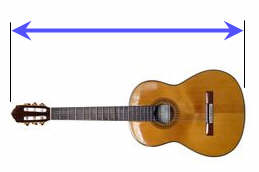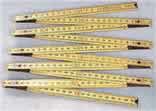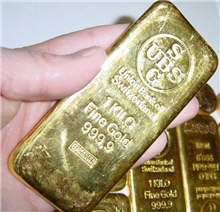Pace Work. 10-D. Maths. 29.03.2021
Topic:Metric System of Measurement
1. Study the theory block:
The metric system is a system of measuring. It has three main units:
| m | the meter for length | |
| kg | the kilogram for mass | |
| s | the second for time |
we can measure nearly everything in the world!
Examples:
Meter
The length of this guitar is
about 1 meter:
When unfolded this ruler
measures 2 meters:
Kilogram
This gold bar has a mass
of 1 kilogram:
A dictionary also has a mass of
about 1 kilogram:
Second
to say "one thousand and one"
Larger or Smaller
But what if we want to talk about really big or really small things?
Answer: we can use Metric Number Prefixes
- like "kilo" (a thousand)
- and "milli" (one thousandth)
- and so on
In fact the kilogram already uses this method, as it's a thousand grams, a kilogram.
Here is a quick summary of the special prefixes:
Common Big and Small Numbers
| Name | The Number | Prefix | Symbol |
| trillion | 1.000.000.000.000 | tera | T |
| billion | 1.000.000.000 | giga | G |
| million | 1.000.000 | mega | M |
| thousand | 1.000 | kilo | k |
| hundred | 100 | hecto | h |
| ten | 10 | deka | da |
| unit | 1 | ||
| tenth | 0,1 | deci | d |
| hundredth | 0,01 | centi | c |
| thousandth | 0,001 | milli | m |
| millionth | 0,000 001 | micro | µ |
| billionth | 0,000 000 001 | nano | n |
| trillionth | 0,000 000 000 001 | pico | p |
These prefixes are used for computers too! A megabyte (MB) is a million bytes, a gigabyte (GB) is a billion bytes, etc.
How to remember?
For large values (each one a thousand times bigger) say:
"kilo mega giga tera"
And for small values (each one a thousand times smaller) say:
"milli micro nano pico"
Try saying them both a few times, they sort of rhyme and become easy to remember.Making Other Units
We can also combine the meter, kilogram and second to make new Units of Measurement!
Here are a few common units that are based on the meter, kilogram and second:
Area
Square Meter
Area is length by length, so the basic unit of area is a square that is 1 meter on each side, in other words one square meter.
The Unit is meters × meters, which is written m2
Volume:
Cubic Meter

Volume is length by length by length, so the basic unit of volume is a cube that is 1 meter on each side, in other words one cubic meter.
The Unit is meters × meters × meters, which is written m3
Liter
A cube that is 1 meter on each side is also equal to 1.000 liters.
1 m3 = 1.000 Liters
Liter is abbreviated L (some people use lowercase l, but that looks too much like 1).
So a liter is actually one-thousandth of a cubic meter.
1 Liter = 11000 m3
Another way of thinking about a liter is:
- A box that is 0,1 meters (10 cm) on each side,
- One square meter that is millimeter thick.
Time
Hour
An hour is 60 minutes, and a minute is 60 seconds, so an hour is:
- 60 × 60 = 3.600 seconds
Day
A day is 24 hours so:
- 1 day = 24 × 60 × 60 = 86.400 second
Speed
Speed in meters per second (m/s)

This is a combination of two units (meters and seconds) to make a new one (m/s).
If something is moving at 1 m/s it moves 1 meter every second.
Speed in kilometers per hour (km/h)
A kilometer has 1000 meters, and an hour has 3600 seconds, so a kilometer per hour is:
- 1000 / 3600 = 1/3,6 = 0,277... m/s
How did I know to make it 1000/3600, and not 3600/1000 (the other way around)?
2. Do the task following the link
Коментарі
Дописати коментар